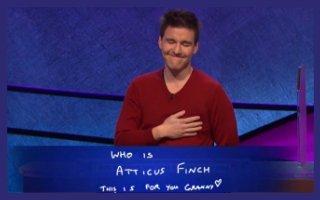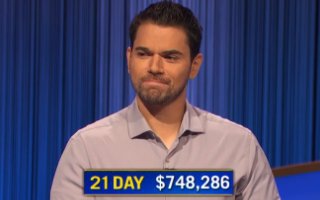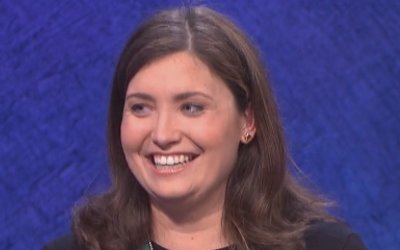Final Jeopardy: Numbers (3-17-15)
The Final Jeopardy question (3/17/2015), in the category “Numbers” was:
This 2-digit number is the smallest prime number whose digits are both themselves prime numbers.
Current champ Kristin Sausville has a 4-day total of $81,002. Today she is up against these new players: Colin Gleeson, from Chicago, IL; and Irene Brockman, from Cambridge, MA.
Round 1: Colin found the Jeopardy! round Daily Double in “Venerable Brands” under the $800 clue. He was in the lead with $6,000, $1,400 ahead of Kristin in second place. He made it a true Daily Double and he was RIGHT.
This company traces its history to the founding of the New York Gas Light Company in 1823, before Thomas was born. show
Colin finished in the lead with $14,400. Kristin was second with $7,200 and Irene was last with $600.
Round 2: Irene found the first Daily Double in “Shakespeare’s Comedies” under the $800 clue. She was in third place with $1,800, $15,800 less than Colin’s lead. She bet the $2,000 allowance and she was RIGHT.
All the words start with the same letter in the title of this play from around 1595. show
Colin found the last Daily Double in “The Salem Witch Trials” under the $1,200 clue. In the lead with $21,200, he had $10,400 more than Kristin in second place. He bet $5,800 and did not know. He got out a guess with demon right after the buzzer went off, but that was WRONG anyway.
5-year-old Dorcas Goode confessed to being a witch & keeping one of these spirits in animal form, in her case a black snake. show
Colin finished in the lead with $19,000. Kristin was next with $12,800 and Irene was in third place with $1,800.
TWO of the contestants got Final Jeopardy! right.
A prime number can be divided evenly only by 1 or itself, and must be a whole number greater than 1. That was all you had to know to figure this one out. Math is Fun.com has a page showing all the prime numbers up to 1,000 and a calculator that will show you if any number up to 4,294,967,295 is a prime number.
Irene got it right. She doubled her money to finish with $3,600.
Kristin also got it right after crossing out the number 11. She bet $399 and finished with $13,199.
Colin wrote down 11. He lost his $6,601 bet so he ended up in second place with $12,399. And that made Kristin a 5x champ with $94,201.

During the chat, Kristin talked about the podcast she hosts from her home about the TV show “Survivor” where they discuss their picks for the series’ legends. She said her all-time favorite is Sandra.
2 years ago:: Only ONE of the players got this FJ in “Europeana”
In the 16th century the ancestors of the current president of France fled what is now this country. show
We may earn a small commission from qualifying purchases made from Amazon.com links at no cost to our visitors. Learn more: Affiliate Disclosure.










I didn’t expect Colin Gleeson to lead through most of the St. Patrick’s Day game. Kristin Sausville set the record number of wins by a married couple, with Justin Sausville, which I was lucky and little bit upset.
I love the look on Kristin’s face. Just a back-off on the math, if you thought I was “off topic”.
The correct answer should be 37. It’s prime, as are 3 and 7.
Never mind – was thinking “largest”, not smallest. Duh.
sad, how soon many forget the most basic things they learned in school. if you tell your math teacher that 1 is a prime # : big fat “F”.
told you guys that “1” will throw a wrench in!!
even kristin almost slipped up. would not have mattered though, even had she been wrong she would have won by $2 due to her and colin’s bets.
had colin stayed put…. BUT you know the saying about ifs, whens and buts…
had he been right then his bet would have been correct. but as mentioned in the spoiler talk, 1 can be confusing.
when i saw the #s, (have not seen the show yet) i thought colin would run away with it. the last dd did him in.
What happened to your “13” prediction? No contestant came up with that number. What was your rationale?
@elijah, excellent explanation.
@Diane, there are over 10,000, prime #s and still counting. If you want to blame someone, blame Euclid.
There are an infinite number of prime numbers. And the proof of that is my favorite proof:
If there were instead a finite number of prime numbers, you could take them all and multiply them together (2×3×5×7×11…). Call the product N.
Now take N+1. Is it divisible by 2? No, because N is divisible by 2, so N+1 can’t be. What about 3? No, because N is divisible by 3, so N+1 can’t be. In fact N+1 can’t be divisible by any of the prime numbers, because N is supposedly divisible by all of them. So it must itself be prime. QED: there are an infinite number of prime numbers.
Very true and still counting because new ones appear continually hence my terminology “ad infinitum.”
You’re correct on all counts. No pun intended.
same with pi….
@elijaht
YOU WERE SAYING ABOUT 11 IN THE SPOILER TALK..????
too bad colin got it wrong, he dominated the game. the last dd was his undoing.
and see my remarks about 1 below again, still a lot of people consider 1 a prime #… :(:(
I’m not sure how to interpret your first sentence. Yes, we were talking about how someone might think 1 is prime, and that did indeed happen.
…hopefully they’ll be able to deduce…
that’s what i meant and that’s exactly what cost colin the game after dominating it. often we give the players too much credit, thinking “they can’t make THAT mistake, being through all the tests etc” when they do exactly that!!
One clarification on that proof. N+1 itself does not have to be prime, but rather it necessarily has a prime factorization in which none of the primes are in that finite list comprising N (in which case you are still “generating” prime numbers and cannot have a finite set of them).
The first example of this is 1+(2*3*5*7*11*13) = 30031 = 59*509. 30031 isn’t actually prime, but still none of its prime factors are among those first six that you assume to be “all” of them.
Whoa
Hey Diane! Because “1” is not a prime number, that’s also why 13 and 17 were not correct. Wikipedia has a good page on prime numbers 🙂
Why is 22 not the correct answer?
What is 11 X 2?
Because 22 can be divided by 2. A prime number can only be divided by 1 or itself and must be greater than 1. 22 is a multiplier of 2×11. “2” is the only even prime #. All other prime #s are odd #s.
E.g., 2, 3, 5, 7, 11, 13, 17, 19, 23, 29, 31, 37, ad infinitum.
Kristin recognized the two-thirds game, which IIRC she made it a two thirds game on the last clue of DJ!
Somebody help me with tonight’s final Jeopardy answer! Eleven is a two digit number in which both digits are prime and it is less than 23, (as are 13 and 17) Why is the correct response 23?
“1” is not a prime number. Basic math.
as i said in the spoiler talk, in the 19th century 1 was by most mathematicians still considered a prime #.
the old greek were wiser, they did often regard 1 not even as a number, any number….it was not until the beginning of the 20th century that 1 was not recognized as prre, and even then some scientists disputed that, in vain of course.
since 1 to the “nth” power is still one.
as simple as that.
over a hundred years ago, most of the best mathematicians still thought differently…
1 is not prime but 2 is not either. Jeopardy is wrong. The smallest number 33.
Ralph, 2 is most certainly a prime, and 33 is most certainly not (3*11).
One is not a prime number.
OK. My math skills are declining. What makes a number a whole number then?
A whole number has no fractions, no decimal points, and no minuses. E.g., 0, 1, 2, 3, 4, 5, ad infinitum.
Assuming you mean a prime number… omitting 1 is basically part of the definition at this point: something along the lines of “numbers greater than 1 divisible only by itself and 1”. (Depending on how you understand “and” in this context, you might say 1 is not even divisible by itself *and* 1 because itself and 1 are the same thing.)
We have to omit 1 because its value presents issues mathematically. For example, if you say to factor 10 into primes, we would generally say “2 × 5”. That is, in fact, the only correct answer to that question (ok, or “5 × 2”). But if we were to say that 1 is a prime number, we’d have to accept “1 × 2 × 5” and “1 × 1 × 2 × 5”, etc. — there would be infinitely correct answers. One just doesn’t *work* as a prime number, so it’s not considered prime.
I have the same question!
I’m glad that I’m not the only one whose math skills are declining and who was confused by the question.
Thanks everyone for straightening me out. John has made me feel better with the explanation that until the beginning of the 20th century mathematicians considered 1 prime. That was when I was last in math class!
DIane, it is 23 because to qualify as a prime number, the number has to have two factors, itself and one, however one has one factor, one. Hope it helps.